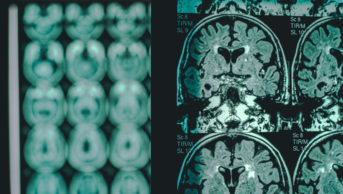
Shutterstock.com
A monoclonal antibody developed for chronic migraine can improve patients’ symptoms within a few days, results of a placebo-controlled study carried out by the drug’s manufacturer Teva Pharmaceuticals show.
TEV-48125 is a monoclonal antibody against calcitonin gene-related peptide, which has recently been shown to be effective for the treatment of chronic migraine and high-frequency episodic migraine.
In the Phase IIb trial, published in Neurology
[1]
(online, 8 June 2016), 261 patients with chronic migraine were randomised to receive injections every 28 days. They were assigned to one of three arms: TEV-48125 900mg; TEV-48125 675mg in the first month followed by TEV-48125 225mg in months two and three; or placebo.
The researchers, led by Marcelo Bigal, head of global specialty clinical development at Teva Pharmaceuticals, found that the reduction in symptoms in patients who took the highest dose of TEV-48125 was significantly greater than placebo three days after treatment began, while patients taking a lower dose saw an improvement seven days after treatment began.

Courtesy of Marcelo Bigal
Marcelo Bigal (pictured sixth from the left with the rest of the research team) found that patients who took the highest dose of TEV-48125 saw a significant reduction in migraine symptoms three days after treatment began
“This is the fastest separation ever demonstrated not only in chronic migraine, but in migraine, headaches and chronic pain overall,” Bigal says.
Both doses also separated from placebo by the second week with regards to the number of moderate-severe headache hours. At one week, patients on the 900mg dose experienced a mean 11.4 hour reduction in cumulative headache hours compared with a 2.9 reduction for placebo, and a 1.3 day reduction in cumulative moderate-severe headache days versus 0.8.
Initial results from the study, which were published in
The Lancet Neurology
(online, 29 September 2015), showed that both doses resulted in a significantly greater reduction in the number of headache hours during weeks 9–12 of treatment compared with placebo. Patients recorded their headache symptoms using an electronic diary and these were compared with those recorded during a 28-day run-in period before treatment randomisation.
At baseline, the average number of headache hours per month was 162, which fell by 59.8 and 67.5 at the high and low dose, respectively, compared with 37.1 in the placebo group.
Bigal says that the speed of TEV-48125’s effectiveness is an important characteristic for potential chronic migraine treatments.
“Chronic migraine is the progression of episodic migraine. It represents the transformation of an episodic disease into a stage where individuals have more days [with symptoms] than not. Often, therefore, they tried lots or all of the medications, and failed,” he explains.
Bigal adds that because patients have often suffered with chronic migraine for a long time – an average of 20 years among those in their study – they may have become sceptical about the possibility of improving and stop taking treatments that could be effective.
“Now there is hope that patients start experiencing improvement quickly, therefore they engage in a therapy that after a few more weeks will substantially decrease their pain,” he says.
Zameel Cader, director of the Oxford Headache Centre, agrees that TEV-48125 works unusually fast. “The rapidity of observable effects suggests that this medication is targeting a central mechanism that sustains chronic migraine,” he says, but warns that further studies are needed to establish whether this was meaningful to patients, as this was not explored in the research.
Cader adds that chronic migraine is an under-recognised condition and there are many difficulties with existing treatments for it, for which only one – botulinum toxin – is currently licensed.
“Many patients experience undesirable and sometimes severe side effects,” he says. “Botulinum toxin is increasingly used and does seem to be safe and effective in reducing headaches and associated disability. There remain however many individuals who do not respond to current treatments.”
Cader adds that antibody therapies are likely to be a “game changer” for the management of chronic migraine. But he notes that it will be important to consider the significant costs of these treatments to health care systems, and that efforts should continue to develop cheaper, small-molecule therapies for the condition.
References
[1] Bigal ME, Dodick DW, Krymchantowski AV et al. TEV-48125 for the preventive treatment of chronic migraine: Efficacy at early time points. Neurology 2016. doi: 10.1212/WNL.0000000000002801


